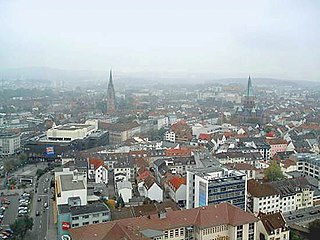
Kaiserslautern is a city in southwest Germany, located in the state of Rhineland-Palatinate at the edge of the Palatinate Forest. The historic centre dates to the 9th century. It is 459 kilometres from Paris, 117 km from Frankfurt am Main, 666 kilometers from Berlin, and 159 km from Luxembourg.

Weilerbach is a municipality in the district of Kaiserslautern, in Rhineland-Palatinate, Germany. It is situated approximately 11 km north-west of Kaiserslautern.

Landstuhl, officially the Sickingen Town of Landstuhl, is a town in the Kaiserslautern district of Rhineland-Palatinate in Germany. It is the seat of Verbandsgemeinde Landstuhl, a kind of municipal association. Landstuhl is situated on the north-west edge of the Palatinate Forest, 11 miles (18 km) west of Kaiserslautern.

Bruchmühlbach-Miesau is a municipality in the district of Kaiserslautern in Rhineland-Palatinate, Germany. It is situated on the small river Glan, approx. 10 km north-east of Homburg, and 25 km west of Kaiserslautern. It has many festivals and is the home of two storks which are the pride of the village. Nearby is the Miesau Army Depot, a United States Army installation. Also nearby is Ohmbachsee, a small lake that is a popular location for concerts, festivals and the weekend.

Hochspeyer is a municipality in the district of Kaiserslautern, in Rhineland-Palatinate, Germany. It is situated in the Palatinate forest, approx. 10 km east of Kaiserslautern.
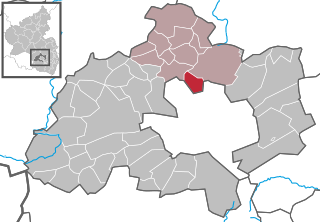
Otterbach is a municipality in the district of Kaiserslautern, in Rhineland-Palatinate, Germany.
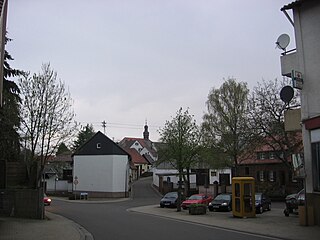
Sembach is a municipality in the district of Kaiserslautern in the state of Rhineland-Palatinate, Germany. It forms part of the Verbandsgemeinde of Enkenbach-Alsenborn. The town is nestled in the Palatinate Forest Nature Park between Kaiserslautern and Donnersbergkreis. Sembach was first mentioned in the 13th century, in a document about a donation to the monastery of Enkenbach.

Schallodenbach is municipality in the district Kaiserslautern of Rhineland-Palatinate, Germany.

Ellweiler is an Ortsgemeinde – a municipality belonging to a Verbandsgemeinde, a kind of collective municipality – in the Birkenfeld district in Rhineland-Palatinate, Germany. It belongs to the Verbandsgemeinde of Birkenfeld, whose seat is in the like-named town.

Gundersweiler is a village and a municipality in the Verbandsgemeinde Nordpfälzer Land and the Donnersbergkreis district, in Rhineland-Palatinate, Germany. It is located in the valley of Moschelbach in the North Palatine Uplands, southwest of Donnersberg and between Kaiserslautern and Bad Kreuznach.
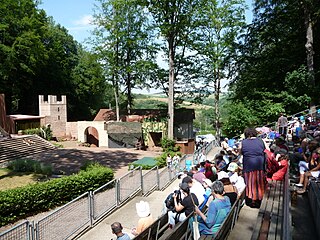
Katzweiler is a municipality in the district of Kaiserslautern, in Rhineland-Palatinate, western Germany.

Schneckenhausen is a municipality in the district of Kaiserslautern, in Rhineland-Palatinate, western Germany.

Queidersbach is a municipality in the district of Kaiserslautern, in Rhineland-Palatinate, western Germany.

Schopp is a municipality in the district of Kaiserslautern, in Rhineland-Palatinate, western Germany. Schopp station lies on the Biebermühl Railway.
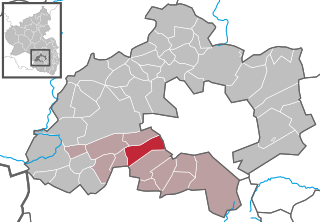
Bann is a municipality in the district of Kaiserslautern, in Rhineland-Palatinate, western Germany. Located in the Steinalb valley with the Palatinate Forest bordering it to the east.

Linden is a municipality in the district of Kaiserslautern, in Rhineland-Palatinate, western Germany.

Rodenbach is a municipality in the district of Kaiserslautern, in Rhineland-Palatinate, Germany. It belongs to the Verbandsgemeinde Weilerbach.

Börsborn is an Ortsgemeinde – a municipality belonging to a Verbandsgemeinde, a kind of collective municipality – in the Kusel district in Rhineland-Palatinate, Germany. It belongs to the Verbandsgemeinde of Oberes Glantal.
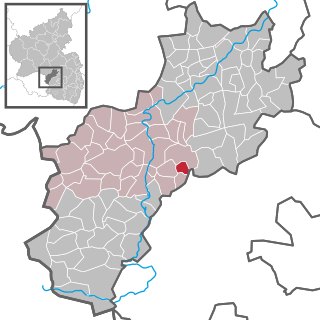
Niederstaufenbach is an Ortsgemeinde – a municipality belonging to a Verbandsgemeinde, a kind of collective municipality – in the Kusel district in Rhineland-Palatinate, Germany. It belongs to the Verbandsgemeinde of Kusel-Altenglan, whose seat is in Kusel.
The Landstuhl Marsh or Landstuhl Bog is a region in West Palatinate in the German state of Rhineland-Palatinate.
























